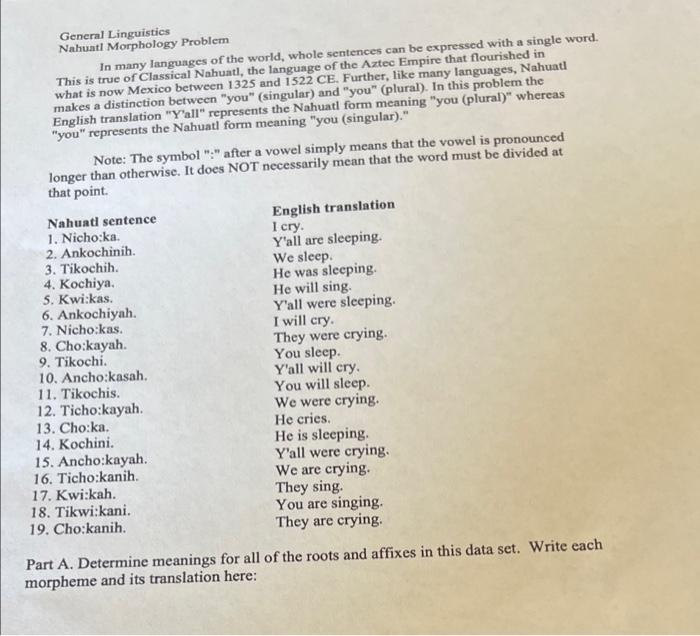General Linguistics Nahuatl Morphology Problem In many languages of the world, whole sentences can be expressed with a single word. This is true of Classical Nahuatl, the language of the Aztec Empire that flourished in what is now Mexico between 1325 and 1522 CE. Further, like many languages, Nahuatl makes a distinction between "you" (singular) and "you" (plural). In this problem the English translation "Y'all" represents the Nahuatl form meaning "you (plural)" whereas "you" represents the Nahuatl form meaning "you (singular)." Note: The symbol":"after a vowel simply means that the vowel is pronounced longer than otherwise. It does NOT necessarily mean that the word must be divided at that point. Nahuat sentence English translation 1. Nicho:ka. I cry. 2. Ankochinih. Y'all are sleeping. 3. Tikochih. We sleep 4. Kochiya. He was sleeping 5. Kwi:kas. He will sing. 6. Ankochiyah Y'all were sleeping. 7. Nicho:kas. I will cry. 8. Cho:kayah. They were crying. 9. Tikochi. You sleep. 10. Ancho:kasah. Y'all will cry 11. Tikochis. You will sleep. 12. Ticho:kayah We were crying 13. Choka, He cries 14. Kochini. He is sleeping. 15. Ancho:kayah. Y'all were crying 16. Ticho:kanih We are crying 17. Kwi:kah. They sing. 18. Tikwi:kani. You are singing. 19, Cho:kanih. They are crying Part A. Determine meanings for all of the roots and affixes in this data set. Write each morpheme and its translation here: General Linguistics Nahuatl Morphology Problem In many languages of the world, whole sentences can be expressed with a single word. This is true of Classical Nahuatl, the language of the Aztec Empire that flourished in what is now Mexico between 1325 and 1522 CE. Further, like many languages, Nahuatl makes a distinction between "you" (singular) and "you" (plural). In this problem the English translation "Y'all" represents the Nahuatl form meaning "you (plural)" whereas "you" represents the Nahuatl form meaning "you (singular)." Note: The symbol":"after a vowel simply means that the vowel is pronounced longer than otherwise. It does NOT necessarily mean that the word must be divided at that point. Nahuat sentence English translation 1. Nicho:ka. I cry. 2. Ankochinih. Y'all are sleeping. 3. Tikochih. We sleep 4. Kochiya. He was sleeping 5. Kwi:kas. He will sing. 6. Ankochiyah Y'all were sleeping. 7. Nicho:kas. I will cry. 8. Cho:kayah. They were crying. 9. Tikochi. You sleep. 10. Ancho:kasah. Y'all will cry 11. Tikochis. You will sleep. 12. Ticho:kayah We were crying 13. Choka, He cries 14. Kochini. He is sleeping. 15. Ancho:kayah. Y'all were crying 16. Ticho:kanih We are crying 17. Kwi:kah. They sing. 18. Tikwi:kani. You are singing. 19, Cho:kanih. They are crying Part A. Determine meanings for all of the roots and affixes in this data set. Write each morpheme and its translation here







